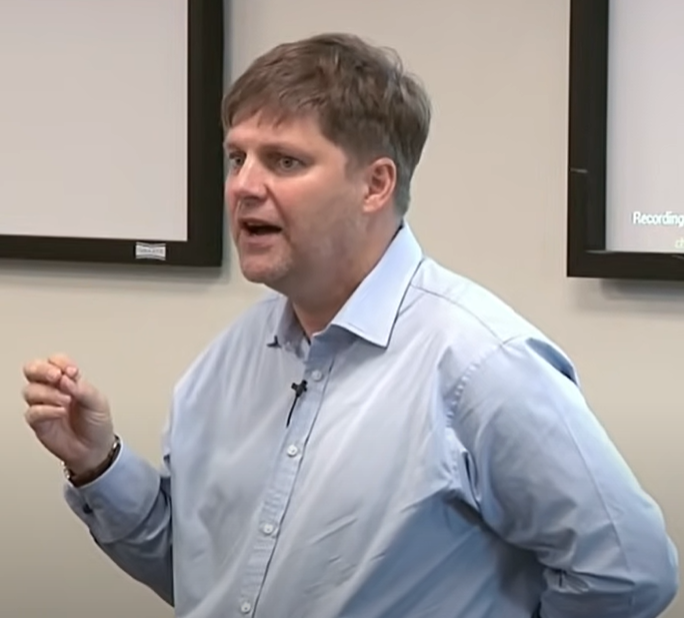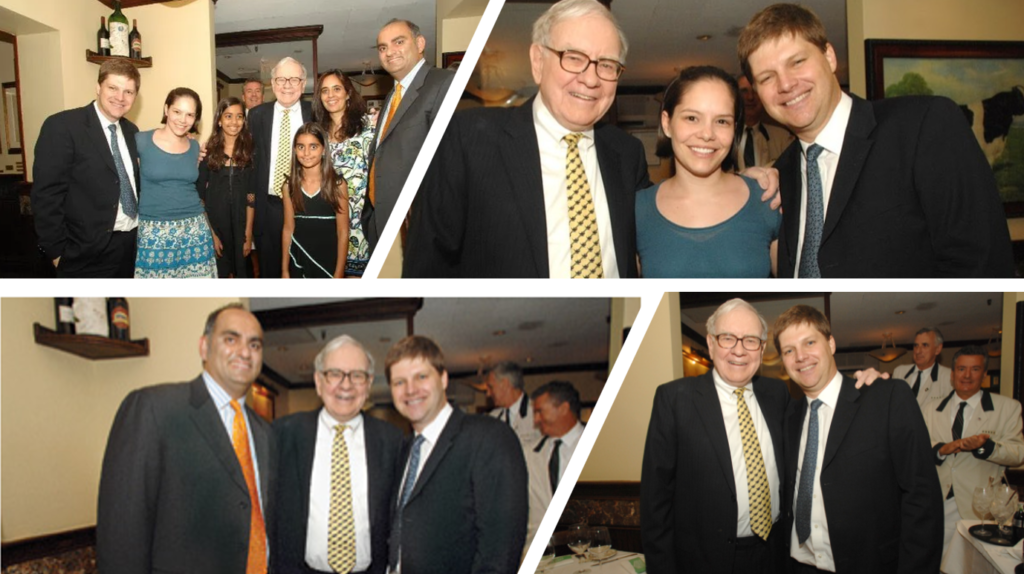In the world of investing, certain individuals shine brightly as beacons of wisdom and inspiration. Guy Spier, a renowned value investor based in Zurich, Switzerland, stands out as one such luminary. His remarkable journey, chronicled in the pages of “The Education of a Value Investor,” has left an indelible imprint not only on the landscape of investment but also on the lives of numerous individuals, myself included.
This blog serves as a platform for me to impart the valuable lessons I’ve garnered from Guy Spier and the profound influence he has exerted on my life and investment philosophy. The roots of this blog can be traced back to the insights I gained from his Google Talk and his illuminating book. (Reference to featured image: https://en.wikipedia.org/wiki/Guy_Spier)
Hi, This is Venkatesh. I write on Personal Finance, Stock Investing, Productivity and Time Management. You will be interested to read more about me and the purpose of my website.
If you are interested in these topics do subscribe to my blogs. You would maximum receive 4 to 5 emails a month. Do check my Blog Index for all my blogs.
- Background of this blog on Guy Spier
- About Guy Spier
-
Key Ideas from Guy Spier for Investing
- Stop checking the stock price
- If someone tries to sell you something – don’t buy
- Don't Talk to Management
- Gather Investment Research in the Right Order
- Discuss Investment Ideas only with people who have No Axe to Grind
- Never Buy or Sell Stocks when the Market is Open
- If a Stock Tumbles After you Buy It, Don’t sell it For Two Years
- Don’t Talk About Your Current Investments
- Key Ideas (Other than Investing) from Guy Spier
- Conclusion
Background of this blog on Guy Spier
In every blog I write, I (try to) make a point to provide a short background on why I chose the topic or why it holds personal significance for me. Let me do the same for this particular topic.
Google Talk by Guy Spier
Back in 2017, I wasn’t very active on Twitter, but I frequently engaged on LinkedIn. It was during one of my LinkedIn browsing sessions that I stumbled upon a post by Tobias Carlisle. In this post, he shared a link to a “Google Talks” presentation by Guy Spier, accompanied by high praise, suggesting that it was a video worth watching repeatedly. Intrigued, I clicked on the video and casually scrolled through it.
However, as I listened to Guy Spier’s speech and absorbed his message, something resonated with me. I felt a strong connection to his message and realized that I needed to delve deeper into his insights and not casually listen to the video. Without hesitation, I bookmarked the video and watched it over the weekend. In fact, I revisited the 2 – 3 times, each time patiently taking notes and absorbing the wisdom he shared.

Inner Change
Up until that day, my primary focus had been on devouring literature related to investing and expanding my knowledge of stock investing. Yet, Guy Spier’s speech had a profound impact on me. It made me realize that life encompasses far more than just financial gains. His ideas about compounding goodwill, the concepts of givers and takers, and much more, began to resonate deeply with me. This marked the beginning of my deepening interest in Guy Spier. I immediately ordered his book and read through it. The book is a candid admission of many things in his life. In his book, he discusses many ideas beyond investing.
This blog will uncover these invaluable insights from Guy Spier, which have profoundly shaped my perspective on life and its multifaceted dimensions beyond the pursuit of wealth.
About Guy Spier
Guy Spier, an esteemed figure in the world of finance, serves as the founder and managing partner of the Aquamarine Fund, a partnership that adheres to a value-oriented investment approach. His widely recognized book, “The Education of a Value Investor,” was published in 2014. Prior to relocating to Zurich, he was a resident of New York.
Notably, in 2008, Guy Spier, alongside Mohnish Pabrai, secured a winning bid of USD 650,100 for a charity lunch with the legendary Warren Buffett. Warren Buffett truly showed up in the charity lunch. He understood that he was there to deliver value. For any question that was asked, he turned that into a learning opportunity. (The italicized lines is as mentioned by Guy Spier in his Google Talk.)

Guy Spier has been an enthusiastic advocate for India as an appealing investment destination. In an interview with the Economic Times of India, he expressed his belief, stating, “I think that India is poised to be an exciting place to be for the next 50 years.” (Reference: https://en.wikipedia.org/wiki/Guy_Spier)
Key Ideas from Guy Spier for Investing
The 8 ideas below are touched upon in his Google Talk and articulated in Chapter 10 “Investing Tools: Building a Better Process” of his book. I have combined the key ideas from both sources and presented it here. These ideas are titled “Building a Better Investment Process”.
Stop checking the stock price
For a generation accustomed to constantly monitoring stock prices by the minute, the concept may appear unusual. Guy Spier, however, posits that this incessant checking of stock prices can deplete the finite well of willpower we possess each day, consuming precious mental energy—a resource in short supply.
If someone tries to sell you something – don’t buy
This concept is very straightforward to put into practice. In Guy Spier’s role as a fund manager, he often found brokers and salespeople attempting to establish connections and sell some idea/product. However, he recognized that these interactions sometimes created a sales-driven environment that placed pressure on him. Once he identified this pattern, he began discouraging sales calls. Instead, when approached by salespeople, he politely requested that they send the information in written form, typically as a PDF.
His rationale is simple: If the seller had a vested interest in him making a purchase, he was inclined not to proceed with the transaction.
Don't Talk to Management
This is the extension of the previous idea. Guy Spier contends that chief executive officers (CEOs) of companies often exhibit exceptional salesmanship skills. They excel at fostering a sense of high optimism regarding their company’s future outlook, often downplaying any business challenges as fleeting issues. However, Spier highlights a notable exception to this pattern in the form of Mr. Warren Buffett, Chairman of Berkshire Hathaway.
Gather Investment Research in the Right Order
Considering the way our brains function, it’s crucial to understand that our minds tend to latch onto the initial idea presented to them. Guy Spier’s approach aligns with this principle. He relies on several sources for information but in a particular order.
- Public filings such as annual reports, 10Ks, and 10Qs. This may not be entirely unbiased, as companies devote substantial attention in sharing the content.
- Auditors’ report has its own shortcoming. They can be influenced by external pressures to overlook irregularities.
- Financial statements is more of an art than a science.
- Other corporate filings such as earnings announcements, press releases, and transcripts of conference calls.
- Equity research by brokerage firms: This comes last but never relied on it.
Discuss Investment Ideas only with people who have No Axe to Grind
The best individuals to engage in investment discussions possess not only intelligence but also the capacity to set aside their egos during the conversation. Such dialogues must adhere to three fundamental rules.
- First and foremost, the discussion must be kept confidential.
- Second, neither party should dictate what the other should do.
- Lastly, there should be no business relationship between the participants.
The primary objective of these discussions is not to arrive at a definitive answer but to foster an “intelligent debate.”
Never Buy or Sell Stocks when the Market is Open
When it comes to making buy or sell decisions, it’s imperative to detach from the market’s price fluctuations. These price movements should not occupy your thoughts or your workspace. So he does not trade when the markets are open. He places Off-the market orders through his broker. Please note that this concept can be somewhat challenging to grasp fully, so I recommend delving into the details in Guy Spier’s book for a comprehensive understanding.
If a Stock Tumbles After you Buy It, Don’t sell it For Two Years
- Making rational decisions about a stock in which you’ve incurred losses can be difficult due to the presence of negative emotions such as regret and fear.
- In such circumstances, Guy Spier adopts a deliberate approach.
- Instead of hastily selling, he deliberately refrains from selling for a period of two years.
- This deliberate delay serves as a mechanism to instil caution when considering the purchase of the next stock, as it obliges him to live with any mistakes made for a minimum of two years.
Don’t Talk About Your Current Investments
This matter doesn’t revolve around others adopting his idea. Rather, once a statement has been made public, it becomes psychologically challenging to retract it, even if one fully acknowledges that the stock pick was incorrect. Guy Spier also provides guidance to individual investors, suggesting that they refrain from discussing their current investments publicly. Such discussions can complicate the process of making rational decisions in the market.
Key Ideas (Other than Investing) from Guy Spier
Guy Spier has touched upon a plethora of such topics that could potentially form the basis of an extensive blog series. In this instance, I will delve into just two ideas that deeply resonated with me and left a profound imprint on my personal growth and development.
Willpower
When Guy Spier has important tasks to tackle, he prioritizes them in the morning when his willpower is at its peak. It’s essential to conserve our willpower wisely. Continuously monitoring a ticker on a webpage can deplete this precious resource, as it prompts the brain to make decisions, such as whether to click on a link or not. If this ticker is eliminated from the page, it helps in conserving willpower. (Source: Google Talk)
How Did I go about using this Idea of Guy Spier?
After reading this, as well as other books by Cal Newport and Tony Schwartz, I grasped the significance of our daily, finite reserve of willpower. Consequently, I’ve adopted a routine where I allocate my mornings to tackling complex, critical tasks that demand creativity and decision-making. This approach has had a profound positive impact on my professional life.
Compounding Goodwill - A novel idea by Guy Spier
Guy Spier imparts valuable advice to investors, emphasizing the significance of appreciating the ‘compounding of personal goodwill.’ He underscores that investing extends beyond the pursuit of wealth alone, stating, “As wealth grows, the money becomes largely irrelevant. What matters in the end is what we can give back to society.”
Drawing from his own experiences, Spier reveals how a simple ‘thank you’ note penned to Mohnish Pabrai ignited a transformative chapter in his life. This gesture laid the foundation for a lasting friendship with Pabrai and eventually led to their joint bid for a charity lunch with Warren Buffett.
Guy Spier underscores that compounding isn’t limited to monetary gains alone; it extends to goodwill as well. He actively sends thank-you notes to individuals who have played a part in his life. He has set a goal of three notes per day, five days a week. Over a span of eight to nine years (as of the time of his Google Talk), he estimates having sent more than 20-30 thousand notes to people across the globe. He attributes many positive occurrences in his life, including key connections, to the compounding of goodwill.
How Did I go about using this Idea of Guy Spier?
Prior to my introduction to the concepts Guy Spier presents and the concept of Compounding Goodwill, I had already established a tradition of personally extending greetings to friends, colleagues, and relatives on special occasions such as New Year or their birthdays. It’s important to note that this wasn’t done through the impersonal bulk messages or group chats that have become commonplace in platforms like WhatsApp today. My preferred approach has always been to deliver these wishes face-to-face whenever possible, with a heartfelt phone call being the next choice, and email serving as the last resort. Remarkably, this practice has consistently elicited warm and appreciative responses from the recipients.
Upon encountering this concept from Guy Spier, I found validation in the fact that my actions aligned with this principle throughout the years. However, this newfound understanding has propelled me to elevate this idea to a whole new level.
In my professional role, I actively engage with clients. In these interactions, I consistently go above and beyond the call of duty to ensure their comfort and well-being, all without expecting anything in return, whether professionally or personally. It’s important to note that this effort may not yield immediate or tangible results, nor do I anticipate instant acknowledgement. However, the true value of these gestures often becomes evident months or even years later when those I’ve assisted reciprocate in kind during my visits to their respective countries. These individuals extend their generosity by helping with transportation, often arranging pick-ups from my hotel to their offices, not just on one or two occasions, but throughout the entirety of my extended stays, which typically spanned 2 to 3 months. Their willingness to go above and beyond was not out of obligation, but rather a genuine desire to make my experience enjoyable, even
Conclusion
The teachings of Guy Spier offer us invaluable insights that extend far beyond the realm of finance. Through his journey as a value investor, he imparts the wisdom of patience, the importance of personal growth, and the value of ethical and principled investing. Guy Spier’s emphasis on compounding goodwill reminds us that true wealth extends beyond monetary gains, highlighting the significance of giving back to society. His journey serves as an inspirational reminder that investing isn’t just about accumulating wealth; it’s also about building a meaningful and purposeful life.
Hope you found this blog useful. Do share my blogs with your friends, peers and fellow investors.


Super article. Great learnings.